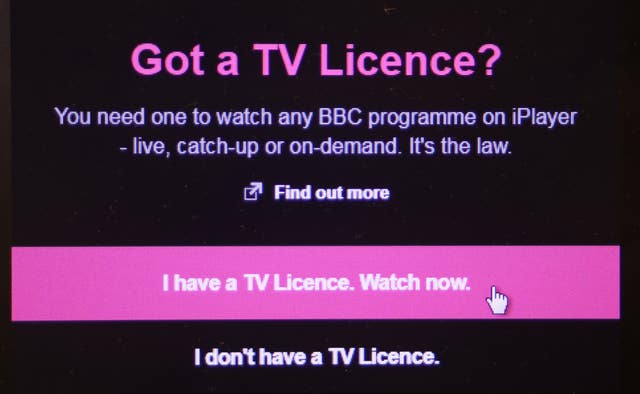The BBC licence fee will increase in line with inflation each year until 2027, rising in April to £174.50, the Government has announced.
It will be an increase of £5, or an extra 42p a month, after the last £10.50 rise brought the charge to £169.50 in April.
The annual fee faced years of scrutiny under the Conservative government, with it being frozen for two years at £159 before it was increased at a lower rate than the corporation expected.
In a written statement to Parliament, Culture Secretary Lisa Nandy said: “The BBC provides much-needed programming for households across the country, including children’s education, world-class entertainment and trusted news for all people in all parts of the UK. I want to see it thrive for decades to come.
“Through the Charter Review, we will have an honest national conversation about the broadcaster’s long-term future, ensuring the BBC has a sustainable public funding model that supports its vital work but is also fair and responsive to those who pay for it.
“In the short-term, we are providing the BBC with funding certainty while supporting thousands more households facing financial hardship to spread the cost of a TV licence.”

The household payment, which funds much of the BBC’s operations, will be increased each year in line with the annual consumer price index (CPI) inflation rate.
The Government will use a review of the BBC’s Royal Charter, which will include a public consultation, to consider funding options to support the broadcaster’s long-term future.
To help households struggling with financial pressures, the Government set up the Simple Payment Plan (SPP), which it will be expanding.
It says the expansion will allow an estimated additional 9,000 unlicensed households experiencing financial difficulty per month to split up the annual payment into more manageable fortnightly and monthly instalments.
The BBC has been under increasing financial pressure and last month revealed a raft of planned changes, including the axing of in-depth interview show Hardtalk, as it looks at reducing more than 100 news roles.
A BBC spokesperson said: “We welcome confirmation that the licence fee will increase in line with inflation next year.
“We want everyone to get value from the licence fee and we are committed to delivering trusted news, the best homegrown storytelling and those special moments that bring us together.
“We also look forward to the debate about the future and working with the Government to ensure sustainable, long-term public funding.
“As part of these discussions we will run our biggest ever public engagement exercise in 2025 so that audiences are at the heart of shaping our future.”
The Government scrapped the BBC Funding Model Review, along with its expert panel, previously set up under the Conservative administration.
Chairwoman of the Culture, Media and Sport Committee Dame Caroline Dinenage said the Government “must make doubly sure that it truly is taking on board as many views as possible, including from across the creative industries, if it is to accomplish its aim of setting up the BBC for success long into the future”.
The MP added: “The licence fee rise is unfortunate timing.
“At a time when many households are already feeling the squeeze, any increase that hits the pockets of the viewers and listeners who rely on BBC programmes could undermine the aim of commanding the support of the people who pay for the corporation.
“We look forward to exploring the detail of the future funding plans when the Secretary of State appears in front of us before Christmas.”




House Rules
We do not moderate comments, but we expect readers to adhere to certain rules in the interests of open and accountable debate.
Read the rules hereLast Updated:
Report this comment Cancel